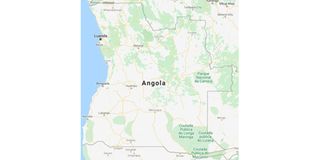Profile: Angola

A map of Angola.
Angola is Africa’s second-largest oil producer and was regularly cited as one of the continent’s fastest-growing economies.
But since the beginning of 2015, the southern African country has faced a serious economic crisis, occasioned by the oil price depression on the international market.
It relies on crude exports for two-thirds of tax revenue, and 95 per cent of its foreign currency receipts.
Key facts
- Capital: Luanda
- Population: 32,8 million with annual growth of 3,2 per cent
- Land Area: 1,246,700 square kilometres
- Official language: Portuguese.
- Main local languages: Umbundu, Kimbundu, Kikongo, Fiote, Chockwe, Nganguela, Kwanyama, Nhyaneka.
- Religion: Its population is overwhelmingly Christian.
- About two-fifths are Roman Catholic, another two-fifths Protestant, and some one-tenth adhere to traditional beliefs or other religions.
- Life expectancy: 61 years
- Currency: Kwanza
- President: João Manuel Gonçalves Lourenço. He took over in August 2017, following an election marking the end of President José Eduardo dos Santos's 38-year reign.
- It gained independence from Portugal on November 11, 1975 and MPLA has governed the country since.
Heroes
Angola celebrates only one hero: Dr António Agostinho Neto (1922-1979)
He was the country’s first president and ruled Angola for four years after independence from Portugal in 1975.
Then Angola descended into civil war until 2002.
The National Hero's Day is a public holiday in Angola, marked on September 17, the birthday of Agostinho Neto.
Civil society and opposition parties’ representatives have been arguing that other heroes must be celebrated such as:
José Eduardo dos Santos, 79, who is celebrated for bringing peace in the country and bringing together people from different political formations;
Dr Jonas Savimbi (1934-2002), who founded the National Union for the Total Independence of Angola (Unita) in 1966.
He led Unita in a 27-year civil war with the Angolan government before transitioning into the main opposition party.
He was killed in battle against government forces in the Lucusse region on February 22, 2002, aged 67.
His body was buried in Luena, the capital of Moxico province, in east central Angola.
The Unita leader's death paved the way for a peace deal that ended one of Africa's longest and bloodiest civil conflicts, which erupted after independence from Portugal in 1975.
Holden Roberto (1923-2007), who was a revolutionary politician and freedom fighter credited for his role in the country’s struggle for independence.
He founded and led the National Liberation Front of Angola (FNLA), an opposition party.
Special places to visit
Luanda: Angola’s capital city has beautiful Atlantic Ocean views.
Kissama: The 70km ride south from Luanda National Park is a wildlife sanctuary.
Tunda Vala Fissure: Located between the cities of Lubango and Namibe and at an elevation of 2,600m above sea level, it is one of the most spectacular natural sights in the country.
Dilolo Lake: It is located in Moxico province and is the country’s largest lake.
The 12km-long lake sits at roughly 1,000m above sea level and teems with wildlife including rare bird species and aquatic life.
Dala Waterfalls: They are about 60m high and conjure a spectacular scene with the mist and spray created from the crashing of the water on the rocks below and are located in Lunda Sul province.
Benguela: The main attractions of the country’s western city are its beautiful ocean-side location, its Portuguese architecture, beaches and friendly people.
Maiombe Forest: It boasts more than 400 square kilometres of forest and is sometimes referred to as the “Amazon of Africa”
Lobito: The port and town of Lobito is situated in Benguela province and is both an important part of the export and tourist economy with plenty of restaurants and old Portuguese buildings.
The Arch Lagoon: Located in Namibe Desert, it is a great place to relax due to its tranquil nature and peaceful surroundings;
Iona National Park: It is the country’s largest national park and covers an expansive area of over 15,000 square kilometres.
Goods
Apart from oil, the country’s biggest export product, Angola has diamonds, iron, copper, manganese, gold, phosphates, uranium, feldspar and platinum. The country’s hydroelectric potential is one of the largest in Africa.
Challenges
The country is oil-dependent and the government is looking at the non-oil sector dominated by agriculture, banking, communications, fisheries, state-owned retail stores and diamond production as a way out.
Elections
Angola is to hold a general election in 2022.
The 2022 polls will be the fourth since the end of the war in 2002. The ruling MPLA won elections in 1992, 2008 and 2012 with a parliamentary majority.
In 2017, MPLA won with 61.07 per cent of the vote and 150 MPs.
Unita, the country’s main opposition party, came second with 26.7 per cent and 51 MPs.
Key Dates
- 1483 – The Portuguese arrive.
- 1979 - José Eduardo dos Santos becomes the country’s second president following Agostinho Neto’s death.
- 1987 - South African forces enter southeast Angola to thwart a MPLA and Cuban offensive against Unita. They withdrew the next year.
- 1991 - Government, Unita sign peace accord in Lisbon.
- 2006- First football World Cup in Germany.
- 2010 – Organises first African Football Cup of Nations in which the Togo national team’s bus was attacked by a terrorist group in Cabinda province.
- 2018 - João Lourenço is sworn in as president.
Source: BBC, World Bank, UN, The Crazy Tourist





